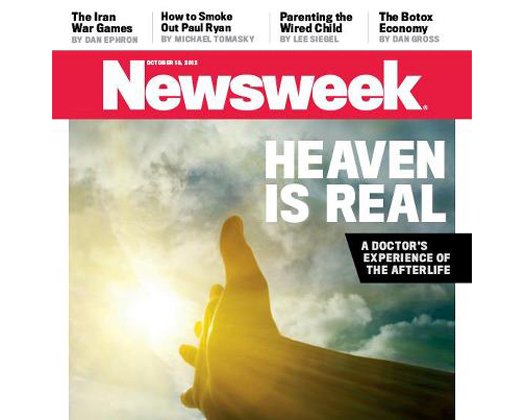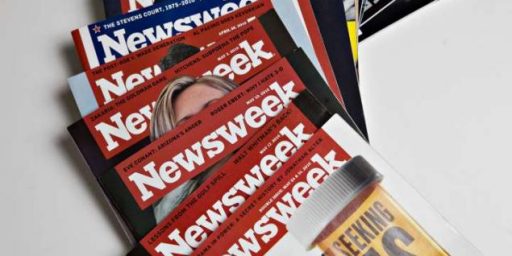Newsweek Going All-Digital
Newsweek is joining US News in getting out of the printed magazine business, leaving Time as the last old American newsweekly standing.
Newsweek is joining US News in getting out of the printed magazine business, leaving Time as the last old American newsweekly standing.
Daily Beast (“A Turn of the Page for Newsweek“):
We are announcing this morning an important development at Newsweek and The Daily Beast. Newsweek will transition to an all-digital format in early 2013. As part of this transition, the last print edition in the United States will be our Dec. 31 issue.
Meanwhile, Newsweek will expand its rapidly growing tablet and online presence, as well as its successful global partnerships and events business.
Newsweek Global, as the all-digital publication will be named, will be a single, worldwide edition targeted for a highly mobile, opinion-leading audience who want to learn about world events in a sophisticated context. Newsweek Global will be supported by paid subscription and will be available through e-readers for both tablet and the Web, with select content available on The Daily Beast.
Four years ago we launched The Daily Beast. Two years later, we merged our business with the iconic Newsweek magazine—which The Washington Post Company had sold to Dr. Sidney Harman. Since the merger, both The Daily Beast and Newsweek have continued to post and publish distinctive journalism and have demonstrated explosive online growth in the process. The Daily Beast now attracts more than 15 million unique visitors a month, a 70 percent increase in the past year alone—a healthy portion of this traffic generated each week by Newsweek’s strong original journalism.
At the same time, our business has been increasingly affected by the challenging print advertising environment, while Newsweek’s online and e-reader content has built a rapidly growing audience through the Apple, Kindle, Zinio and Nook stores as well as on The Daily Beast. Tablet-use has grown rapidly among our readers and with it the opportunity to sustain editorial excellence through swift, easy digital distribution—a superb global platform for our award-winning journalism. By year’s end, tablet users in the United States alone are expected to exceed 70 million, up from 13 million just two years ago.
Currently, 39 percent of Americans say they get their news from an online source, according to a Pew Research Center study released last month. In our judgment, we have reached a tipping point at which we can most efficiently and effectively reach our readers in all-digital format. This was not the case just two years ago. It will increasingly be the case in the years ahead.
Other than the fact that the brand “Newsweek” still has some cache for us old-timers, this news is hardly relevant. The notion of a weekly news magazine has long since been rendered quaint by the Internet. And, frankly, there’s very little value remaining in that once-venerable brand, which Tina Brown has been diminishing on a weekly basis with outrageously sensational cover stories. Few, I suspect, miss US News and it likely won’t be long until Time follows suit. One suspects the Economist, the archetype and by far the crown jewel of the weeklies, will survive the longest.






Not surprising, especially given the recent transition to trolling at the venerable brand.
Google “newweek cover story economics” and the top story is our friend Megan with Is College a Lousy Investment? She actually beats out Niall Ferguson with the much more deplorable Obama’s Gotta Go
Hat tip to Megan for making the cover before they pulled the plug.
(LOL, I just noticed the cover story in your graphic .. “Is Heaven Real?”)
More newspapers will soon be going digital if they don’t go bust first.
I think that there is still a demand for print magazines, even if it´s for the dentist waiting room. The problem is that Tina Brown destroyed any value that Newsweek still had.
The real future is magazines that are readable on a tablet. We haven’t had a print magazine subscription for years. Now I read 5-6 monthly mags on my iPad. There’s no way Zinio isn’t going to make money hand over fist.
I was a Newsweek reader for 16 years, but around the 2008 the writing just got so bad I felt like I was wasting my time reading it. When the “We’re All Socialists Now” cover came out, that was the straw that broke the camel’s back and I stopped renewing.
I subscribed for about 10 years in the mid 1980s to mid 1990s. They started shifting in the mid 90s to replacing a dozen or so pages of news content with extended advertising sections masked as news writing. Once I noticed the pattern, I cancelled my subscription.
I kept on responding to renewal soliticians falsely claiming that my subscription was about to run out to the point that my Newsweek subscription runs though some time in 2014, when I had planned to no longer renew. I wonder if the lefties that run the joint will send me a refund check? Ha, ha. There is no honor among thieves.
@Andre Kenji: Except for dentists, Drs., barber shop where was the last place you saw one of these? My son gets SI I think.
It’s the New Deal come full circle. But even back then, radical treatment of public affairs was a suicide note.
Of interest, the 1930s was the time when the writer moved inside the office, the current time is when they’ve been thrown out into the freelance again.
Newsweek deserves to fail.
I subscribed for a very long time until Jon Meacham’s endless Christian cover stories, as well as his Christian fingerprints popping up in articles on science and medicine, made me throw in the towel. When Tina Brown took over, I didn’t even bother giving it a chance. Any woman who could practically destroy The New Yorker was not, imo, going to save the dying Newsweek.
OTOH, about the same time I was ditching Newsweek, I was planning on ditching Business Week because after at least two remakes, it, too, had been reduced to nothing more than a tree destroyer. Then Bloomberg bought it and has turned it into a must-read for me. Unlike The Economist or the WSJ, it has a moderate editorial stance and seems pretty much wedded to facts rather than ideology (e.g., a couple of excellent pieces debunking various “small business” myths). In addition, almost every issue has an investigative piece on some subject about which I know or have heard/read nothing.
The Economist, for me, is my weekly take on the world, Bloomberg BW gives me a solid overview of business in the U.S., and The New Yorker is, well, The New Yorker. Even though I get the latter both digitally and in print, I prefer the print version and certainly hope that all three continue to be available in print format.
In short, I think Newsweek could have been saved. It just had the very bad luck of having two very bad editors (Meacham and Brown) in succession.